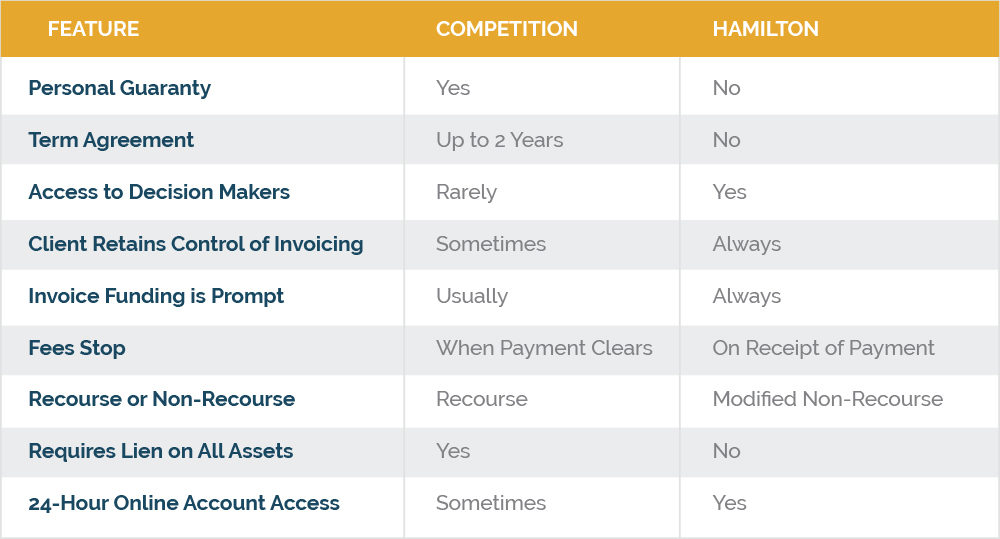
BROKER FORMS
At Hamilton, Brokers are the mainstays of our sales team. That's why we are committed to providing you with the tools necessary for success. After all, our business depends on your referrals. Hamilton has even dedicated a salesperson to work exclusively with the broker community.
Feel free to download and print the following tools:
1. Broker Commission Income
Why should you become a Hamilton Broker? Here's why...
2. Broker Agreement
Email or Mail your completed application to The Hamilton Group. Instructions are on application.
3. Application for Factoring
Email or Mail your completed application to The Hamilton Group. Instructions are on application.
FOR BUSINESS BROKERS & CASH FLOW CONSULTANTS
At Hamilton, we realize referrals are the drivers of our success. That is why we are determined to provide our brokers with the most professional, responsive and flexible service in the industry. Whether you are an established broker, or just starting out, Hamilton is committed to providing you with the information and resources necessary for success.
Why should you consider becoming a broker for Hamilton over other factors?
- Modified non-recourse structure
- Diverse factoring programs
- Respectful and consistent service
- A timely approval process
- Direct dialogue with decision makers
If you are interested in exploring your opportunities as a broker for The Hamilton Group, please send an e-mail to:
Michael Howe
FAST FACTS
Pricing
Aggressive, industry low, effective rates
Minimum Fee
10 days (not 30 days, like others)
Advance Range
70% to 85% of invoice amount
Fee Range
0.50% to 1.00% of invoice amount per 10-day period
Fees Stop
Day Hamilton receives payment of invoice from customer—Fees stop as soon as payment is received, not when the check clears
Fees Start
Day after date of invoice funding
Other Fees
Due-diligence fee up to $350 after award. Hamilton does not charge any fees for reviewing financing applications or researching credit worthiness
Minimum Volume
None—No non-usage fees either. Clients can factor all their invoices in one month and none the next. This is helpful for those companies with seasonal demand or unpredictable cash flow.
Escrow Account
None—Clients are not required to tie up their cash flow in collateral or escrow accounts
Maximum Volume
$3,000,000 per client exposure at any one time
Set Up Time for First Deal
3 to 5 business days
Minimum Time Commitment
None—There are no obligations to enter restrictive, long-term agreements
Invoice Turnaround
24 hours—Once initial set-up is complete, all funding thereafter occurs within 24 hours
Accounting
Per invoice—Each invoice stands alone and is reconciled individually. This means that reserve payment occurs separately for each invoice.
Reserve Payment Turnaround
3 business days—The remaining balance is returned to client 3 business days after Hamilton receives payment for the invoice from the customer
Website
Free 24-hour client access
Commissions
Your fee is "evergreen"—For as long as your referred client works with Hamilton, you will receive commission income.
FACTORING & YOUR PROSPECT
Where to Find Prospects and Referral Sources
- Government and business vendor lists
- Local Chamber of Commerce member lists
- Internet financial databases
- Advertisers in business and trade publications
- Small business shows and trade shows
- Small Business Development Centers
- Accountants, attorneys, bankers, stock brokers and business consultants
Ideal Industries for Factoring
Factoring can be a beneficial form of financing for most any industry, especially ones where accounts receivable realization does not match operational needs. In other words, industries where large proportions of invoices are not paid in time to meet payroll or other debt obligations. Some of these industries include:
- Manufacturers
- Import
- Defense Contractors
- Communications
- Temporary Employment Services
- Janitorial Services
- Transportation
- Computer Hardware/Software
- Consulting
- Distribution
- Food
- Professional Services (Financial, Legal)
NOTE: Due to credit and trade laws, Hamilton does not factor third-party medical or construction industries.
Ideal Businesses for Factoring
Simply, if a business makes or sells a product or delivers a service to a credit-worthy commercial customer on trade terms, that business is a candidate for factoring. Hamilton's clientele share the following traits:
- The need for working capital to support operations required for revenue growth (e.g., marketing, product development, payroll, accounts payable).
- Periodic cash flow pressure due to seasonal demand or unexpected sales is experienced more than 2 to 3 times per year.
- For any number of reasons, do not possess or choose not to possess traditional bank credit lines to support operational growth.
- The need for accelerated receipt of outstanding invoices.
- The desire to take advantage of trade discounts or other long-term sensible financial investments.
Hamilton looks for certain criteria when evaluating a specific business for its factoring programs. Whether a business satisfies all or one of these criteria, financing is ultimately a judgment of Hamilton.
- Business must be LLC, C Corp or S Corp (not D/B/As, sole proprietorships, or partnerships).
- Generate revenues of at least $100,000 per year.
- Be profitable, or if not, possess a credible plan to achieve profitability within 1 year.
- Have a clean tax record or the ability to correct current deficiencies.
- Have no liens currently placed on accounts receivable. In other words, accounts receivable are not already pledged as collateral.
- Possess strong customer relationships.



